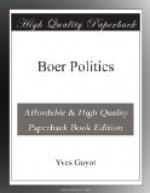Motion of the Commission.
“The Ninth International Peace Congress after hearing the report on the events of the year sent by the Berne Bureau, though without pretending to assume the right to pass judgment on the policy of a friendly nation unless it should be to affirm publicly the everlasting principles of international justice, declares that:
1st. “The
responsibility of the war which is now devastating
South
Africa lies with the
Government which refused several times to
countenance arbitration,
that is with the British Government.
2nd. “The English Government by ignoring the principles of right and justice, which have been the glory of the great British nation, i.e., by refusing to arbitrate and indulging in threats which were bound fatally to lead to war, whereas the difficulties might have been solved by judicial means, has committed an outrage against the rights of nations, of such a nature as to check the pacific evolutions of humanity.
3rd. “The Congress equally regrets that, the majority of the Governments represented at the Hague Conference, had not taken any steps to assure the respect of resolutions which were to them an undertaking of honour.
4th. “The
Congress considers that it is advisable to appeal to
public opinion as regards
the Transvaal.
5th. “The Congress expresses its profound sympathy and admiration to the English members of the Congress for the manliness of their declarations, and it hopes that under similar circumstances their example will be followed by other nations.”
Mr. Jaffe, of London, alluding to public opinion in England, said that arbitration could only be resorted to by sovereign powers, that the Transvaal was not a sovereign power, and also that any judgment arrived at by arbitration on the various points in dispute between England and the Transvaal, would have been difficult to execute. Mr. Jaffe referred to the approval, almost unanimous, with which the war was looked upon in England and her Colonies; it had provoked great enthusiasm, and it would be a mistake to hurt the feelings of a whole nation.
The wording of the resolution as proposed by the Commission was adopted by all the members but one.
Mr. Lafontaine, Belgium, proposed to add another resolution which ran as follows:
“The congress hopes that the crime or to use the corrected phrase, the error of depriving the South African Republics of their existence and independence will not be committed definitely; it makes an earnest appeal to civilised governments to intervene as mediators in favour of the two Republics.”
After various observations had been made by Mr. Giretti (Italy), Hodgson Pratt, Frederic Passy and Moscheles (the English delegates) the proposition was rejected by 170 votes against 60.
LONDON:
BOYLE, SON & WATCHURST,
PRINTERS,
WARWICK SQUARE, E.C.




